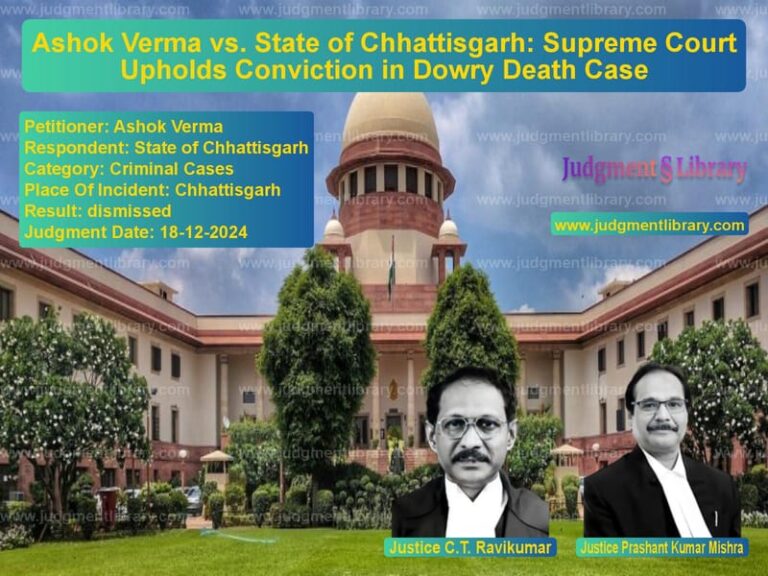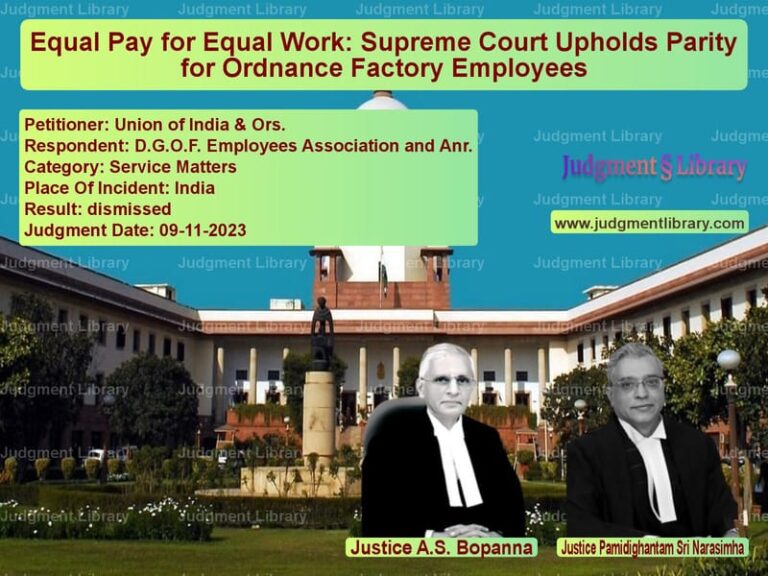Murder Conviction Overturned: Supreme Court Acquits Nathiya and Suresh in Husband’s Death Case
The Supreme Court of India, in the case of Nathiya & Another vs. State Represented by Inspector of Police, Bagayam Police Station, Vellore, addressed the legality of a murder conviction based entirely on circumstantial evidence. The appeal arose from a Tamil Nadu High Court decision upholding the conviction of Nathiya and her alleged paramour, Suresh, for the murder of Nathiya’s husband, Gurunathan. The Supreme Court examined whether the evidence presented by the prosecution was sufficient to sustain their conviction under Section 302 read with Section 34 of the Indian Penal Code (IPC).
The case revolved around allegations of an illicit relationship, suspicions of conspiracy, and an alleged confession to a Village Administrative Officer (VAO). However, the appellants argued that the evidence was circumstantial, incomplete, and insufficient to establish guilt beyond a reasonable doubt. The Supreme Court ultimately overturned the conviction and acquitted the appellants.
Background of the Case
The case was initiated when Gunasekaran, the cousin of the deceased, lodged a First Information Report (FIR) on March 27, 2006, at 2:30 a.m. He claimed that Gurunathan, a bookbinder, owned property worth lakhs and had confronted his wife, Nathiya, about her alleged affair with Suresh. The FIR alleged that:
- Nathiya and Suresh had an illicit relationship, which was known to the deceased and the community.
- The deceased had reported their affair to the local panchayat, which advised against its continuation.
- Despite warnings, the relationship continued, leading to tensions between the couple.
- A few days before the incident, Nathiya allegedly tried to suffocate Gurunathan with a pillow.
- On March 26, 2006, Gurunathan informed Gunasekaran that Nathiya and Suresh were conspiring to kill him.
The next day, the deceased’s body was found floating in a well. The FIR was registered as Crime No. 278 of 2006 at Bagayam Police Station, leading to an investigation and subsequent charges against Nathiya and Suresh.
Key Legal Issues
The Supreme Court examined the following questions:
- Whether the circumstantial evidence was sufficient to prove the guilt of the accused beyond a reasonable doubt.
- Whether the alleged confessions made before the Village Administrative Officer were admissible.
- Whether the prosecution established the motive for the murder.
- Whether the medical evidence supported the prosecution’s theory of homicide.
Petitioner’s Arguments
The defense contended:
- The case was built entirely on circumstantial evidence without any eyewitness testimony.
- The prosecution failed to establish a continuous chain of evidence linking the accused to the crime.
- The alleged confessions to the Village Administrative Officer were inadmissible as they were not recorded in compliance with the law.
- The medical evidence was inconclusive in proving that the death was homicidal rather than accidental or suicidal.
- There was no evidence that the accused were last seen with the deceased before his death.
- The FIR was based on mere suspicion and did not establish actual involvement.
Respondent’s Arguments
The prosecution argued:
- The accused had a clear motive—eliminating Gurunathan to continue their illicit relationship.
- Witnesses testified that the deceased had previously expressed fears for his life.
- The accused’s extramarital affair was well known, and Nathiya had previously attempted to harm the deceased.
- The presence of both accused at the crime scene shortly after the incident raised suspicion.
- The medical evidence showed injuries that suggested the deceased was first smothered and then thrown into the well.
Supreme Court’s Observations
The Supreme Court analyzed the circumstantial evidence and concluded that it did not establish guilt beyond a reasonable doubt. The key observations were:
1. Lack of Direct Evidence
The Court emphasized that there was no eyewitness testimony linking the accused to the crime. The case was based entirely on circumstantial evidence, which needed to be strong enough to exclude any other possibility.
2. Inadmissibility of the Confession
The alleged confession before the Village Administrative Officer was deemed unreliable, as it was not recorded before a magistrate. The prosecution failed to produce the written confessional statements in court.
3. No Clear Proof of Homicide
The medical report did not conclusively establish that the deceased was murdered. While there were injuries on the deceased’s head, the possibility of an accidental fall into the well could not be ruled out.
4. Motive Alone Cannot Prove Guilt
The Court reiterated that merely proving a motive is insufficient. The prosecution had to establish actual involvement, which it failed to do.
5. Circumstantial Evidence Must Form a Complete Chain
The Court cited Sharad Birdhichand Sarda vs. State of Maharashtra (1984) and Raja @ Rajendra vs. State of Haryana (2015), which held that circumstantial evidence must be so conclusive that it leaves no room for any other hypothesis. In this case, the evidence was fragmented and inconclusive.
Final Judgment
The Supreme Court ruled in favor of the appellants and overturned their conviction. The key takeaways from the judgment were:
- The prosecution failed to prove the case beyond a reasonable doubt.
- The accused were entitled to the benefit of doubt.
- The conviction was set aside, and Nathiya and Suresh were acquitted.
Judgment Outcome: Appeal allowed, conviction overturned.
Don’t miss out on the full details! Download the complete judgment in PDF format below and gain valuable insights instantly!
Download Judgment: Nathiya & Another vs State Represented by Supreme Court of India Judgment Dated 08-11-2016.pdf
Direct Downlaod Judgment: Direct downlaod this Judgment
See all petitions in Murder Cases
See all petitions in Bail and Anticipatory Bail
See all petitions in Attempt to Murder Cases
See all petitions in Judgment by Dipak Misra
See all petitions in Judgment by Amitava Roy
See all petitions in allowed
See all petitions in supreme court of India judgments November 2016
See all petitions in 2016 judgments
See all posts in Criminal Cases Category
See all allowed petitions in Criminal Cases Category
See all Dismissed petitions in Criminal Cases Category
See all partially allowed petitions in Criminal Cases Category







